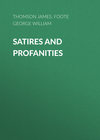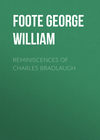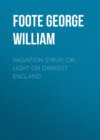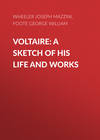Kitabı oku: «Satires and Profanities», sayfa 7
THE ONE THING NEEDFUL
(1866.)
When I survey with pious joy the present world of Christendom, finding everywhere that the true believers love their neighbors as themselves and are specially enamored of their enemies; that no one of them takes thought for the morrow, what he shall eat or what he shall drink, or wherewithal he or she shall be clothed; that all the pastors and flocks endeavor to outstrip each other in laying not up for themselves treasures upon earth, where moth and rust corrupt, and where thieves break through and steal; and all are so intensely eager to quit this earthly tabernacle and become freeholders of mansions in the skies; when I find faith as universal as the air, and charity as common as cold water; I sometimes wonder how it is that any misbelievers and unbelievers are left, and feel astonished that the New Jerusalem has not yet descended, and hope that the next morning’s Times (rechristened The Eternities) will announce the inauguration of the Millennium.
What delayeth the end? Can there indeed be any general hindering sin or imperfection among the pure saints, the holy, unselfish, aspiring, devout, peaceful, loving men and women who make up the population of every Christian land? Can any error infect the teachings of the innumerable divines and theologians, who all agree together in every particular, drawing all the same doctrines from the same texts of the one unvaried Word of God? I would fain believe that no such sin or error exists, not a single inky spot in the universal dazzling whiteness; but then why have we to deplore the continued existence of heathens and infidels? why is the New Jerusalem so long a-building? why is the Millennium so long a-coming? why have we a mere Sardowa instead of Armageddon?
After long and painful thought, after the most serious and reverent study, I think I have found the rock on which the ship of the Church has been wrecked; and I hasten to communicate its extreme latitude and interminable longitude, that all Christian voyagers may evade and circumvent it from this time forward.
The error which I point out, and the correction which I propose, have been to a certain extent, in a vague manner, pointed out and proposed before. A clergyman named Malthus, not in his clerical capacity, but condescending to the menial study of mundane science, is usually considered the first discoverer. But mundane science is conditioned, limited, vague, its precepts are full of hesitation; while celestial science is absolute, unlimited, clear as the noonday sun, and its precepts are imperiously forthright.
It seems to me that the one fatal error which has lurked in our otherwise consummate Christianity, and which demands immediate correction is this, that the propagation of children is reconcileable with the propagation of the faith – an error which while it lasts adjourns sine die the day of judgment, and begins the Millennium with the Greek Kalends.
One need not quote the numerous texts throughout the New Testament (let Matthew xix., 12, suffice) proving that Jesus and the epistolary apostles accounted celibacy essential to the highest Christian life. One only of the disciples, so far as we know, was married; and he it was who denied his master; and most of the more profound divines consider that Peter was justly punished for marrying, when Christ cured his mother-in-law of that fever which might else have carried her off.
But many modest people may be content with a respectable Christian life which is not of the very highest kind. They may think that as husbands and wives they will make very decent middle-class saints in heaven, after a comfortable existence on earth, leaving the nobler crowns of holiness for more daring spirits. Humility is one of the fairest graces, and we revere it; but there is a consideration, most momentous for the kind Christian heart, which such good people must have overlooked – very naturally, since it is very obvious.
Jesus tells us that many are called but few are chosen; that few enter the strait gate and travel the narrow way, while many take the broad way that leadeth to destruction. In other words, the large majority of mankind, the large majority of even those who have the gospel preached to them must be damned. When a human soul is born into the world, the odds are at least ten to one that the Devil will get it. Can any pious member of the Church who has thought of this take the responsibility of becoming a parent? I thoroughly believe not. I am convinced that we have so many Christian parents only because this very conspicuous aspect of the case has not caught their view. If the parents could have any assurance that the piety of their offspring would be in proportion to their own, they would be justified in wedding in holiness. But alas! we all know that some of the most religious parents have had some of the most wicked children. Dearly beloved brethren and sisters pause and calculate that for every little saint you give to heaven, you beget and bear at least nine sinners who will eventually go to hell.
The remedy proposed is plain and simple as a gospel precept: let no Christian have any child at all – a rule which, in the grandeur of its absoluteness makes the poor timid and tentative Malthusianism very ridiculous indeed. For this rule is drawn immediately from the New Testament and cannot but be perfect as its source.
Let us think of a few of the advantages which would flow from its practice. The profane have sometimes sneered that Jesus and his disciples manifestly thought that the world would come to an end, the millennium be inaugurated, within a very few years from the public ministry of Jesus. Luckily the profane are always ignorant or shallow, or both. For, as the New Jerusalem is to come down while Christians are alive, and as Christians in the highest sense or Christians without offspring must have come to an end with the first generation, it is plain that the belief which has been sneered at was thoroughly well founded; and that it has been disappointed only because the vast majority of Christians have not been Christians in the highest sense at all, but in their ignorance have continued to propagate like so many heathen proletarians.
Now, supposing the very likely case that all Christians now living reflect upon the truth herein expounded, and see that it is true, and, therefore, always act upon it, it follows that, with the end of our now young generation, the whole of Christendom will be translated into the kingdom of heaven. Either the mere scum of non-Christians left upon the earth will be wholly or in great part converted by an example so splendid and attractive, and thus translate all Christendom in the second edition in a couple of generations more; or else the world, being without any Christianity, will, as a matter of course, be so utterly vile and evil that the promised fire must destroy it at once, and so bring in the New Heavens and New Earth.
Roman Catholic Christians may indeed answer that, although the above argument is irresistible to the Protestants, who have no mean in the next life between Heaven and Hell, yet that it is not so formidable to them, seeing that they believe in the ultimate salvation of nearly every one born and reared in their communion, and only give a temporary purgatory to the worst of their own sinners. And I admit that such reply is very cogent. Yet, strangely enough, the Catholics, even more than the Protestants, recognise and cultivate the supreme beatitude of celibacy; their legions of unwedded priests, and monks, and nuns and saints are so many legions of concessions to the truth of my main (arguement).
I am aware that one of the most illustrious dignitaries of our own National Church, the very reverend and reverent Dr. Swift, Dean of St. Patrick’s, has advocated on various grounds, and with impressive force of reasoning, the general eating of babies: and I anticipate that some prudent Christians may, therefore, argue that it is better to get babies and eat them than to have none at all, since the souls of the sweet innocents would surely go to heaven, while their bodies would be very nourishing on earth. Unfortunately, however, the doctrine of Original Sin, as expounded and illustrated by many very thoughtful theologians, and specially theologians of the most determined Protestant type, makes it very doubtful whether the souls of infants are not damned. It will surely be better, then, for good Protestants to have no infants at all: Q. E. D.
THE SWINBURNE CONTROVERSY
(1866.)
Not having read Mr. Swinburne’s “Poems and Ballads,” I have nothing to say on the special case in which they are involved. A few of the adverse critiques I have chanced to see, and these almost avail to convince one that Mr. Swinburne is a true poet. The Saturday Review, shocked out of the complacency of its stark peevishness, cried, “Pretty verses these to read aloud to young ladies in the drawing-room!” As if there were any great book in existence proper to read aloud to young ladies in drawing-rooms! and as if young ladies in drawing-rooms were the fit and proper judges of any great book! I should like to watch the smuggest and most conceited of Saturday Reviewers attempting to read aloud to young ladies in a drawingroom certain chapters in the Bible, certain scenes of Shakespere, certain of the very best passages in Chaucer, Spenser, Dryden, Pope, Swift, Fielding, Sterne, Smollett, Burns, Byron, Shelley. When Mr. Swinburne answers that he writes for full-grown men and women, the acute Fun affirms that men have read his book and have condemned it. As if our present brood of periodical critics were men! At home in private life, some of them probably are; but in their critical capacity, that is to say incapacity, how many of them have any virility? The Athenaeum squashes the detestable book by proclaiming that it contains such and such things in the style of Alfred de Musset, George Sand, Victor Hugo, Ovid, etc.; that is to say, in the style of some of the best Latin and modern French writers! As for Punch, he makes a joke worthy of his present lively condition (were it not for Mr. C. H. Bennett, one would say that there was no blood at all left in Mr. Punch when the great Leech dropped off), suggesting that the author should take the appropriate name of Swine-born. But the mass of our present critics are so far beneath contempt that we will waste no more time upon them.
I have just one remark to make, however, before saying a few words on the general issue raised by this particular process. A large number of highly respectable elderly personages in gowns, for the most part belonging to the priesthood of our very dear National Church, and who by themselves and by good Bumbledom in general are accounted the real clerisy of England, have devoted all, or nearly all, the years of their maturity to what is termed the classical instruction of ingenuous youth. The ingenuous youth thus magnificently instructed comprise young men of the highest rank, with the most money and leisure and the reddest blood in the nation. Is it not rather ludicrous to see the said begowned elderly personages all wringing their hands and smiting their breasts, weeping and lamenting in sore astonishment and perplexity and terror, when one of these young men dares to give sign that he has actually in some degree assimilated such classical instruction, instead of merely gulping it down hastily and then vomiting it all crude at the examinations?
As to the general questions, I will start by avowing frankly my conviction, that, in the present state of England, every thoughtful man who loves literature should rejoice in the advent of any really able book which outrages propriety and shocks Bumbledom, should rejoice in its advent simply and exactly because it does outrage propriety and shock Bumbledom, even if this book be nauseous to his own taste and bad in his own judgment. For the condition of our literature in these days is disgraceful to a nation of men: Bumble has drugged all its higher powers, and only the rudest shocks can arouse them from their torpor. We have still, indeed, by the inscrutable bounty of nature, three or four great writers, the peers of the greatest in Europe; out they stand like so many forest-trees, antique oaks of Old England, in a boundless flat of kitchen-gardens – cabbage and lettuce, radishes and onions, and all the many-leaved “pot-boilers,” fit only to be soddened and seethed in a pot, and “to pot,” thank goodness, they all quickly go.
Our literature should be the clear and faithful mirror of our whole world of life, but at present there are vast realms of thought and imagination and passion and action, of which it is not allowed to give any reflex at all, or is allowed only to give a reflex so obscure and distorted as to be worse than none. But, it may be objected, suppose Satyrs come leering into your mirror and Bacchantes whirl before it? I answer that the business of a mirror is clear reflection: if it does not faithfully image the Satyr, how can it faithfully image Hyperion? And do you dread that the Satyr will be preferred to Hyperion, when both stand imaged in clear light before us? It is only when the windows are curtained, when the mirror is a black gulph and its portraitures are vague dark shadows, that the beautiful and the noble can pass undistinguished from the hideous and the vile.
If, indeed, the realities not reflected became unrealities, were annihilated, then there would be some sense in veiling those portions of the mirror in front of which certain features of our life are exposed. And if that which sees not could not be seen, it would be very sensible of the hunted ostrich to hide its head in the sand. But we all know that in darkness what is filthy and vile grows ever filthier and viler, what is pure and sweet sickens and decays.
“We have left undone those things which we ought to have done; and we have done those things which we ought not to have done; and there is no health in us.”
We have suppressed mention of all facts which Bumble would fain ignore, and utterance of all opinions likely to disturb his sacred peace; we have canted enough to nauseate the angels, and have continually lied for God as for a man to pleasure him; so our popular books are fit for emasculated imbeciles, the Times is our leading journal, and the Daily Telegraph boasts the largest circulation in the world! And in the meanwhile the police-reports are full of putrid flesh, all the blue-books are crammed with statistical dry bones; flesh from the carcases and bones from the skeletons in that mass of death and corruption under our imperial whited sepulchre.
I do not complain of the kitchen-garden literature; many of the vegetables are very wholesome and savory in their season, very good for eating to-day and forgetting to-morrow; I complain that in the interest of kitchen-gardens the rearing of all grander and loftier vegetation, the growth of secular forest-kings has become almost impossible in England. The stupidest popular book would not be popular did it not find a large number of people still more stupid than itself, to whom it is really entertaining and instructive. These stupid people one does not blame, one can only pity or envy them according to one’s mood. But what shall one say of that large number of educated people who are not stupid, who are familiar with continental literature; who yet, if an English book appears advocating ideas such as they have been delighted with in a French or German dress, feign astonishment and horror, and join with all the poor little curs of Bumbledom in yelping and snarling at it? These men who know well what they are doing are the accomplices of Bumble who does not know what he is doing, who fondly fancies that he is doing something very different, in starving on thin diet and stupifying with narcotic drugs the intellect of our nation once so robust and active; and assuredly if the process goes on much longer we shall come to rank mentally as a third-rate Power in Europe.
No intelligent man in England, without (which is a contradiction in terms) his ideas are exactly coincident with the non-ideas of Bumble, or without he is rich and independent, can afford to devote himself to honest treatment of any great religious or social, moral or philosophical question. If treated in a book, he must himself pay the expense of publication; if treated in an article, not even by payment could he get the portals of any popular periodical to open unto him. For periodicals – newspapers, magazines, reviews – are the Fools’ Paradise of the commonplace, the mediocre, the orthodox, the respectable. As the strength of a chain must be measured by its weakest link, so the thought of a periodical must be measured by the thought of its most imbecile subscribers. A periodical to live must be a commercial success; the faintest thrill of new ideas would affect its circulation by shocking off some of its regular readers; it must suit its articles to the size of its customers – a very little hat for a very little head, a very little thought for a very little brain. Thus, though in thinking of their criticisms I spoke so contemptuously of our critics, I do not doubt that many of them are much wiser than their articles. The most honest of them must live by their pen, so they do not attempt to tell the whole truth though they will not tell a lie; many, however, undoubtedly are as apt for the sin of commission as for the sin of omission.
A noteworthy instance occurs to me as I write. An eminent English author, in some respects even a great author, complained that in our country no one since Fielding had dared to attempt the full and faithful portraiture of a man, and he set himself to the task in a work published by instalments. As he entered upon certain phases of common virile life, the circulation of the serial began to decrease. This author was eminent, well-off, much more honest and wise and brave than ninety-nine authors in a hundred: of course, having begun his work he would honestly finish it, he would not only tell the truth and nothing but the truth, he would also tell the whole truth? – he quietly left off painting the features objected to, finished such as were agreeable to the public, and said with a cynical scorn (flavored perhaps with some bitterness of self-scorn), “So you don’t want to see and hear the whole truth? Very well!” This author was revered by the great and noble-hearted Charlotte Brontë; this author was *Thackeray, strong with all the prestige of Vanity Fair; he could not think of continuing a course injurious to his “circulation,” so “Pendennis” is not almost worthy (as it might, else have been) to stand beside “Un Grande Homme de Province à Paris” of Balzac.
When such is Thackeray, what must be Gigadibs?
If I write this rather strongly it is because I feel that I am writing in the interest of strength and health and purity and freedom, at a time when the mass of our literature is infected with servile weakness and disease and that “obscenity, which is ever blasphemy against the divine beauty in life.” For all obscene things batten on darkness, and light is fatal to them. But for the Bumble who rules over us, the naked beauty is obscene and the naked truth is blasphemous; he thinks that the Venus de Medici came out of Holywell Street, and is inclined to believe that all the fossil records of geology were forged by the Devil to throw discredit upon the book of Genesis. One cannot without a keen pang of shame and rage think of what we are when one remembers what we were, when one recalls our old and glorious literature, in the wide world unsurpassed; our literature noble and renowned, ever most glorious when most manly and daring.
GREAT CHRIST IS DEAD
(1875.)
We have all heard the wonderful story, recounted by Plutarch in his treatise on the Cessation of the Oracles, how, in the reign of Tiberius Cæsar, a ship sailing from Greece to Italy was becalmed for the night at the islet-rock of Paxus in the Ionian Sea, between the Echinades and Ithaca, when a loud and terrible voice from the land called Thamous the pilot. And he having responded at the third appeal, “I am here; what would you with me?” the voice, grown yet louder and more terrible, commanded him to announce on arriving at Palodes that Pan the Great was dead. Accordingly, when the vessel reached this place, whose site I believe the learned have not yet fixed, Thamous stood on the prow and lifting his voice shoreward cried, “Pan the Great is dead!” – whereon were heard great moanings and lamentations, mysterious and multitudinous. Not having Plutarch at hand, I have refreshed my memory from Rabelais, who repeats this well-authenticated story by the mouth of Pantagruel, in the twenty-eighth chapter of the fourth book of his inestimable work, following soon on that tempest of all tempests wherein Friar John and Panurge so variously distinguished themselves. The good Pantagruel goes on to expound the story after his own manner, thinking that it referred not to the heathen god Pan, but to our Lord and Savior, Jesus Christ, “ignominiously put to death by the envy and iniquity of the pontiffs, doctors, presbyters, and monks of the Mosaic dispensation…”
For with good right may he in the Greek tongue be called Pan, seeing that he is our All; all we are, all we live, all we have, all we hope, is him, in him, of him, by him. He is the good Pan, the great Shepherd… at whose death were moanings, sighs, trepidations and lamentations in all the machine of the universe, heavens, earth, sea, hells. With this my interpretation the time agrees. For that most good, most great Pan, our only Savior, died at Jerusalem, reigning in Rome Tiberius Caesar. – Pantagruel, these words said, rested in silence and profound contemplation. A little while after we saw the tears rolling from his eyes, large as ostrich eggs. I give myself to God if I lie in a single word.” Notwithstanding the thrilling pathos of this close, and my deep reverence for Rabelais, with whom no commentator in holy orders known to me can be compared, except Dean Swift, I am inclined on this point to follow the ordinary opinion that Pan the great god whose death was thus miraculously announced was the Pan of the heathen Greeks. Christ had died, but only pro tem; had descended into Hell, but with a return ticket, and simply to harry that realm of Old Harry; in three days he had risen from the dead, in forty more ascended into Heaven; his reign had begun and the reign of the old gods was ended; the spirit was exalted ana the flesh brought low, this world and life were contemned for the life and world to come; Nature, the All, the great Pan, was annulled, and the Supernatural Nothing throned supreme. The poets have chanted this momentous revolution according to their religion, their phantasy, or their mood. Milton in his Hymn on the Nativity shouts harsh Puritanical scorn on the oracles stricken dumb, and the deities overthrown. Shelley in a magnificent chorus of “Hellas,” “Worlds on worlds are rolling ever,” contests not the justice of their doom, while in the final chorus he predicts the same doom for their conqueror in his turn, In our own day Mr. Swinburne in the “Hymn to Proserpine,” and elsewhere, has bewailed the dead immortals, with nothing but aversion and contempt for the pale Galilean, the “ghastly glories of saints, dead limbs of gibbeted gods.” Leopardi an early poem “To Spring,” beautiful but not of his deepest, regrets the banished divinities, and since the halls of Olympus are void, appeals to Nature to restore to his spirit its first fire, if she indeed lives. Schiller in his “Gods of Greece” passionately laments them; and Mrs. Browning more passionately answers him, crying, “God himself is the best Poet, and the Real is his song and the Real we accept perforce in its fulness, but discern not how it can derive from an unreal God. Novalis in his “Hymns to the Night” laments with Schiller the unsouling of Nature, “bound in iron chains by arid number and rigorous rule;” but goes on to celebrate the resurrection of Humanity in Christ. Heine in his. “Gods of Greece,” after declaring in his wild way that he has never loved the old deities, that to him the Greek are repugnant, and the Romans thoroughly hateful, yet avows that when he considers how dastardly and windy are the gods who overcame them, the new reigning sorrowful gods, malignant in their sheep’s, clothing of humility, he feels ready to fight for the former against these. This change of the celestial dynasty is indeed a favorite theme with him. Elsewhere he pictures the Olympians holding high revelry, with nectar and ambrosia, with Apollonian music and inextinguishable laughter, when suddenly a wretched Jew staggers in, his brow bleeding from a crown of thorns, trailing on his shoulder a heavy cross, which he heaves upon the banquet table; and forthwith the revel is no more, the divine feast disappears, the everburning lights are quenched, the triumphant gods and goddesses vanish terror-smitten, dethroned for ever and ever. And again, in his incomparable “Gods in Exile,” he tells us what became of these dispersed Olympians during the Dark Ages, in the thick night of the noontide of Christianity; how they were transformed from celestial to infernal by the monstrous superstition of that baleful era; as we find the hoofs and horns of Pan transferred to the Devil himself; as we find Venus in that legend of Tannhauser which has fascinated so many poets, as well as great Wagner, —
Vénus, ma belle déesse,
Vous êtes diablesse!
More than eighteen hundred years have passed since the death of the great god Pan was proclaimed; and now it is full time to proclaim the death of the great god Christ. Eighteen hundred years make a fairly long period even for a celestial dynasty; but this one in its perishing must differ from all that have perished before it, seeing that no other can succeed it; the throne shall remain void for ever, the royalty of the Heavens be abolished. Fate, in the form of Science, has decreed the extinction of the gods. Mary and her babe must join Venus and Love, Isis and Horus; living with them only in the world of art. Jesus on his cross must dwindle to a point, even in the realms of legend under Prometheus on Caucasus. For ages already the Father has been as spectral as Jupiter; for ages already the Holy Ghost has been but the shadow of a shade. And the last, not least, member of the Divine Royal Family, Satan the Prince of Darkness, Prince of this World, and Prince of the Powers of the Air, is no more alive than Pluto, who also was born brother to the Monarch of Heaven. The Hebrew dynasty of the gods is no more; it has done much evil in its long sovranty, which we will try to forget now it ceases to reign; it has done some little good, whose remembrance we will cherish when it is sepulchred, Christ the Great is dead, but Pan the Great lives again, as Mr. Maccall told us in some lines published in this paper several years ago. Pan lives, not as a God, but as the All, Nature, now that the oppression of the Supernatural is removed. I may be told that Christianity is yet alive and flourishing, that its priesthood and its churches hold possession of Europe and America and Australia. So the priesthood and the shrines of the Olympians kept possession of the Roman Empire centuries after the crucifixion of Jesus. When the spirit of a faith has departed, that faith is dead, and its burial is only a question of time. When the noblest hearts worship not at its altars, when the most vigorous intellects abandon its creeds, the knell of its doom has rung. At the risk of being thought bigoted or prejudiced, I must avow that to my mind the decomposition of Christianity is so offensively manifest and advanced, that, with the exception of a very few persons whose transcendent genius could throw a glamor of glory over any creed however crude and mean, and whom I recognise as far above my judgment, I can no longer give my esteem to any educated man who has investigated and still professes this, religion, without grave deduction at the expense of his heart, his intellect, or his conscience, if not of all three. Miraculous voices are not heard in these days; but everywhere myriads of natural voices are continually announcing to us, and enjoining us to announce to others, Great Christ is dead!








